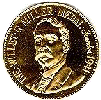
The Miller Medal is an award of the Royal Society of Canada given for outstanding research in any branch of the earth sciences . The award consists of a gold-plated silver medal and is awarded every two years if there is a suitable candidate. [1] [2]
Contents
In 1941, twelve friends of Willet Green Miller, FRSC (1867–1925), a distinguished geologist, and a guiding force in the development of the Ontario mining industry, subscribed funds to provide the Willet G. Miller Medal for geology.